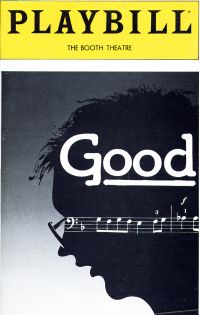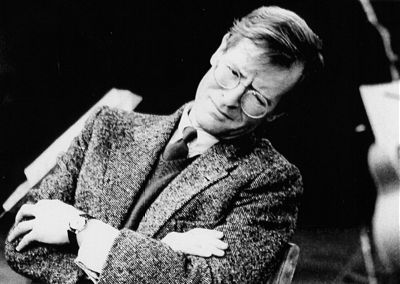
Alan Howard
Gary Waldhorn
Nicholas Woodeson
Meg Wynn-Owen
Felicity Dean
Marjorie Yates
Pip Miller
David Howey
Kate Spiro
Timothy Walker
 |
Cast for USA
production: Alan Howard Gary Waldhorn Nicholas Woodeson Meg Wynn-Owen Felicity Dean Marjorie Yates Pip Miller David Howey Kate Spiro Timothy Walker |
Alan Howard shines in RSC productionConsidered solely on its own merits, the late C.P. Taylor's Good, which came to the Booth last evening in a Royal Shakespeare Company production, is a very clever, if unduly attenuated, piece of stagecraft. But with Alan Howard's brilliantly versatile, endlessly resourceful performance as its linchpin, it becomes a fascinating, and eventually moving piece of theater. The play is like the fragmented memory of its protagonist, a bespectacled Frankfurt novelist, critic, and professor of literature who is ineluctably, almost unknowingly, drawn into the hideous sphere of Nazidom. He is a "good" man, at first amused (in the early '30s) by Hitler's antics and inclined to discount the new chancellor's anti-Semitism, but subtly drawn to the cause and, in the end, emerging as a major newly arrived at Auschwitz. |
 |
We are really inside the mind of Professor John Halder. On an almost bare stage, members of his family, his best friend (a Jew), and his mistress mill about, along with the figures of Hitler, Eichmann and other members of the Nazi hierarchy. And while he is vaguely aware that something uncommon, and perhaps even undesirable, is happening in Germany, snatches of song and instrumental music spin soothingly off the top of his mind, allaying any doubts he might have. But when, in full uniform, he arrives at the death camp, the music becomes real as he hears the notorious prisoners' orchestra playing Schubert's March Militaire.
When Halder's friend, Maurice, tries unsuccessfully to persuade Halder to get him railway tickets to Switzerland, Maurice leans on the upright piano stage center and sings a chorus or two of My Blue Heaven. For his part, Halder hears strains of Wagner's Tannhauser Overture at one point. The music, conducted from the piano, is played by a quintet that sets up at the very start of the evening.
The play, tricky as it is, and even bloodless, comes very close to outsmarting itself. And forgetting the artifice, it is almost as simplistic as Halder convinces himself the Nazi ideology is. This is the author's very point, of course: the good professor has a slatternly wife who can't even cook a meal (he does the cooking), three children, a blind, senile and complaining mother and, in due course, a mistress in the form of an adoring student with whom he runs off to a woodland retreat, though one not too far from his university post. Taking great pains to show us how the most decent and agreeable of men can embrace evil, Taylor has surrounded him with cardboard characters. Even Maurice, though he has a salty tongue, is a stock figure.
As one might expect in an RSC production, the performance and the mounting of the work are flawless. Ultz, the costumer as well as the stage designer, has slanted twin rows of long-armed, metal-shaded white bulbs from above the players and deep into the sides of the orchestra, so that the theater itself is illuminated as if for a lecture or concert of some sort.
In addition to Howard's searching, restless performance, there is fine work by Gary Waldhorn as Maurice, Meg Wynn-Owen as wife Helen, Felicity Dean as mistress Anne, Nicholas Woodeson as Eichmann, and Pip Miller as the ideal Aryan officer who just happens to possess a collection of banned jazz recordings on which he has pasted misleading labels. Marjorie Yates as the complaining mother, and David Howey as a Chaplinesque Hitler, are other assets.
The playing of Kurt Weill's 1938 September Song during the 1933 putsch was the only musical anachronism I was aware of. And at this point, a compliment is in order for the accomplished quintet.
Whatever reservations I may have expressed about the play itself stop dead at Howard. This is one of the great actors of our time in a magisterial performance.
Douglas Watt
Daily News (USA), 14.10.1982.